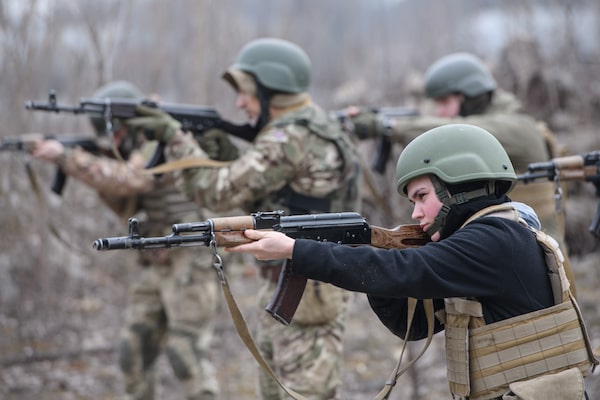
In the Kyiv region, new recruits to Third Assault Brigade were busy training for combat in March. More recently, Ukraine estimates it might have only weeks to go till a new Russian offensive.Photography by Olga Ivashchenko/The Globe and Mail
At a military checkpoint outside of Kyiv, Rostyslav Ovramenko was pulled from a bus on his way to work, and issued a summons by an officer, ordering him to report to the local territorial defense centre.
Standing on the side of a highway on a chilly day in March, Mr. Ovramenko, 32, told The Globe and Mail that he doesn’t think it’s right for people to be issued these papers while they’re on a bus on their way to work. He said he has a few concerns about joining the army, but a big one is his family.
“I have two children and I don’t want them to be left without a father,” he said. He is also worried that troops are not trained well enough before they are handed weapons.
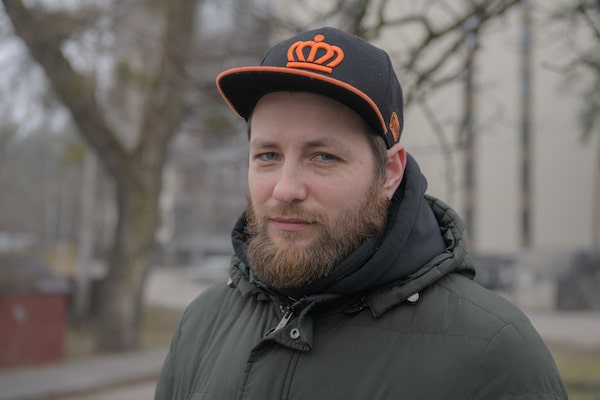
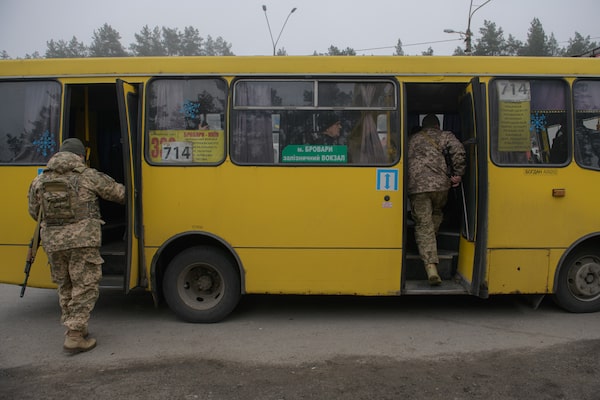
After receiving a draft notice on the bus to work, Rostylav Ovramenko, 32, wasn't happy about such tactics from army recruiters.
In anticipation of a major Russian offensive coming within weeks, Ukraine is making efforts to bolster its tired ranks. Earlier this month, President Volodymyr Zelensky made legislative changes to that aim, including the unpopular move of lowering the eligible draft age from 27 to 25, clarifying some exemptions and creating an online registry for recruits. He said recently that Russia is preparing to mobilize an additional 300,000 troops by June 1.
On Tuesday, Ukraine made an additional move by announcing the suspension of consular services for military-age men abroad until May 18. At the beginning of Russia’s full-scale invasion, Ukraine imposed martial law, which prevented men aged 18 to 60 from leaving the country, unless they had a special exemption.
But after years of bloody war, young men are ambivalent about going to the front lines. While they are united in their country’s resolve to fight, most who would volunteer already have. Those who are left are afraid, some of them angered by tactics used by officials to conscript them, such as issuing summonses in public places.
Hoping to avoid being sent to battle, some young men are even hiding at home or anxiously scouring Telegram, a social-media messaging platform, where people post sightings of recruitment officers.
In western Ukraine, Maxym Kliuchkovych lives far from the battle on the front lines that zigzag through the east and south of the country, but he has seen men return from there, and he’s reluctant to go.
It seems as if everyone around the 30-year-old has been mobilized to serve in the army, he says, including his father and other relatives. He’s not sure why he hasn’t been summoned, but fighting isn’t something he wants to do. He has a wife and a newborn, he explains, and he doesn’t want to leave them.
“I think the war is unfair because a lot of my acquaintances, my neighbours – they were taken to the front line after mobilization, they didn’t have enough training, so it’s really hard for me to see these neighbours come home in a coffin without legs and hands.”
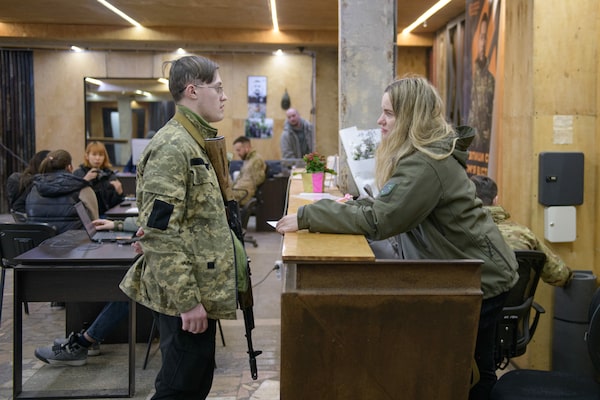
Recruitment centres like this one in Kyiv have been allowed to enlist younger Ukrainians since the eligible draft age lowered from 27 to 25. President Volodymyr Zelensky says the military needs all the help it can get if Russia mobilizes its expected 300,000 additional troops by June.
Ukrainian MP Inna Sovsun, the deputy leader of the opposition Holos party, meanwhile, is concerned with a particular aspect of the mobilization bill. She abstained from voting on it because while she supports the move, the bill doesn’t contain provisions on the terms of service. She said the initial draft stipulated that after 36 months of service, soldiers could be relieved and return to their lives, with new people replacing them – but that part was taken out.
Ms. Sovsun said people have been serving since Day 1 of the full-scale invasion, including her partner, without any idea when someone will replace them.
“It’s very personal for me. I can see it in my partner. I see how difficult it is and how exhausted him and many others who have been serving more than two years, specifically those who are serving on the front line, how tired they are,” she said.
Ms. Sovsun said when it comes to the process of mobilization, officers have to act quickly because the army needs people. She said her ex-husband, her son’s father, was mobilized while walking on the street and told to report to the draft centre. He went the next morning.
“Was I excited about that? No. But there is no popular way to mobilize people into the army.”
She said people looking for excuses to avoid serving undermines Ukraine’s chances and has led the country to the current situation, where the same people who are already exhausted continue to serve. Motivating people to serve is difficult when the country feels left alone while it awaits military aid, she said. “It’s the matter of weapons that wins the war, not the number of people.”
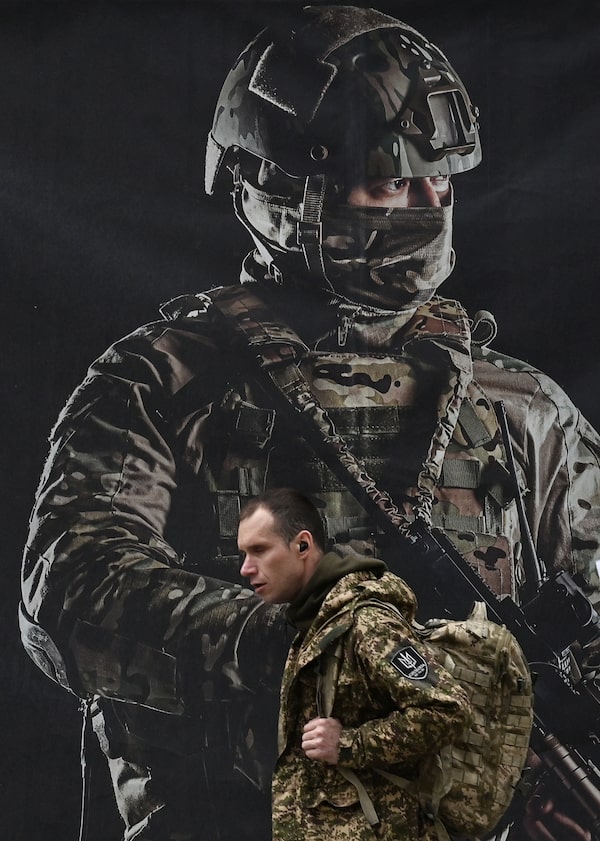
Ukraine's recruitment messaging, like this poster in Kyiv, has had to win over an increasingly war-weary nation.SERGEI SUPINSKY/AFP via Getty Images
Ukrainian MP Oleksandra Ustinova, faction leader of the same party, voted in favour of the mobilization legislation. She said it creates an obligatory online registry, and if eligible men do not register within 60 days, they will lose access to many government services.
“This is the constitutional duty to protect your country,” she said, adding that the mobilization bill was challenging because everyone in the country knows someone who is fighting, or has lost someone to the fight.
Ms. Ustinova said Ukraine has been blessed to have a lot of people sign up to join, but they need a break, a chance to take a warm shower and eat normal food.
She said the online registry will help to locate more recruits because, with millions of people internally displaced, some were getting missed.
Ms. Ustinova said Russian propaganda has also been used to influence Ukrainians’ views on joining the army.
“Russian propaganda is hitting hard because the Russian propaganda was saying if you sign up for the army, you die, because you don’t have armoured vehicles, we don’t have shells,” she said, adding there was also a lot of fake information online that said that only poor people were going to the army. That’s not true, she said; Ukrainian members of Parliament are fighting.
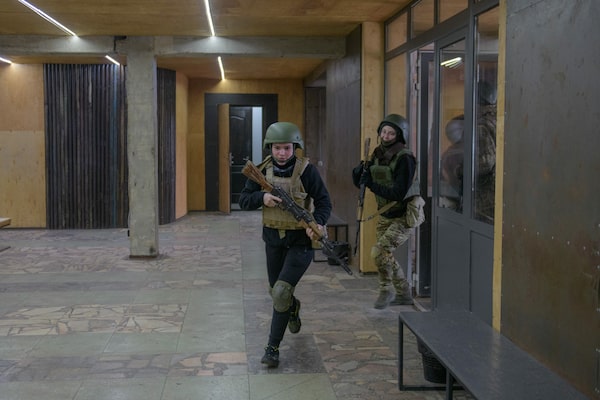
Trainees at the Third Assault Brigade are allowed to leave without signing a contract if they wish, but if they do stay, a fundraising campaign aims to keep them well supplied with medical kits and weapons.
Some brigades are trying to attract recruits by offering specialized training, making sure soldiers feel prepared, and not pressuring them to join.
The deputy head of the recruitment centre in Kyiv for the Third Assault Brigade – who goes by the call sign “Ded,” Ukrainian for grandpa – sat behind a desk as recruits prepared for training outside.
“There are a lot of wounded soldiers, that’s why someone needs to replace them and here is the problem,” he says.
The Globe and Mail is only identifying soldiers by their call signs to protect their security.
An upside at his centre, Ded says, is that they offer a lot of training, and if potential recruits do not want to stay, they can leave. Many people seek out this unit, he adds, because there is a large public-relations campaign raising funds to cover most expenses, such as medical kits and weapons.
“We prepare our soldiers for everything that could happen on the battlefield,” he said, explaining that while serving in Avdiivka, before it was captured by Russian soldiers in February, their troops were able to provide medical assistance to the wounded because of their training.
Ded said he’s not sure how many people this brigade needs, but that it would benefit from young recruits in particular. Soldiers in their 20s will be easier to train and will recover better from injuries than older troops in their 40s, he said.
He said about half the people who show up for training leave without signing a contract, but their policy is not to force people to join.
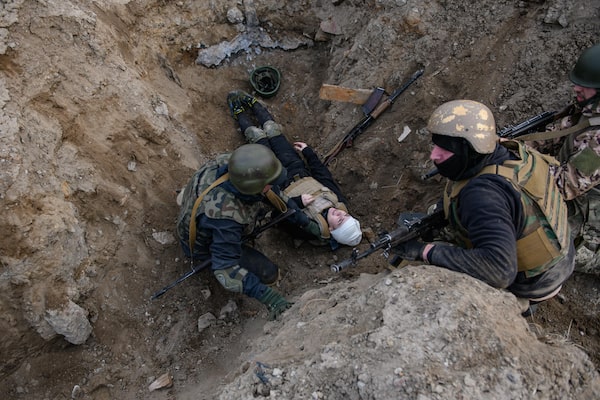
Would-be members of the Third Assault Brigade are trained to keep an eye on one another, to make sure everyone has what they need to fight.
Outside in the training yard, an instructor told a couple dozen recruits standing in the hardened dirt that this unit is a family and before battle they are responsible for ensuring that every other member is ready to fight, which means checking over their comrades to ensure they have enough bullets and ammunition.
Later, the soldiers were divided into groups, with some representing the dead and others the wounded. They laid in trenches waiting for their comrades to evacuate them and provide first aid. Occasionally, instructors threw fireworks into the trenches to create conditions that mimic the battlefield.
Standing outside a trench, a 26-year-old man who goes by the call sign Chestnut said he had been living abroad and travelling in South America when the war began. He returned to Ukraine last summer, but needed some time to prepare, but also to decide, before joining the army.
“There’s no way back once you go there,” he said, adding that he previously doubted himself. “Because you’re like, ‘Maybe I’m not made for war, maybe I’m made for something else’ – but somebody should fight, you know?”
He said seeing a lot of young people dying propelled him to act. The morning he went to this recruitment centre, he first visited a coffee shop called Kashtan, which is Ukrainian for Chestnut. And that’s how he chose his new name.
“It was a nice contrast between one world where things are a bit different, and this one.”
With reports from Reuters and Kateryna Hatsenko